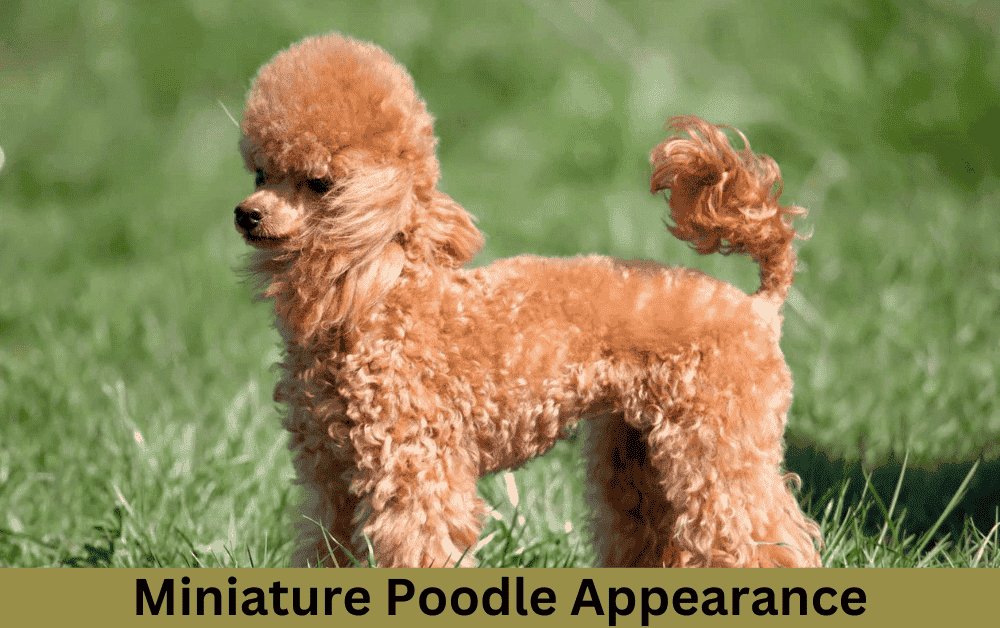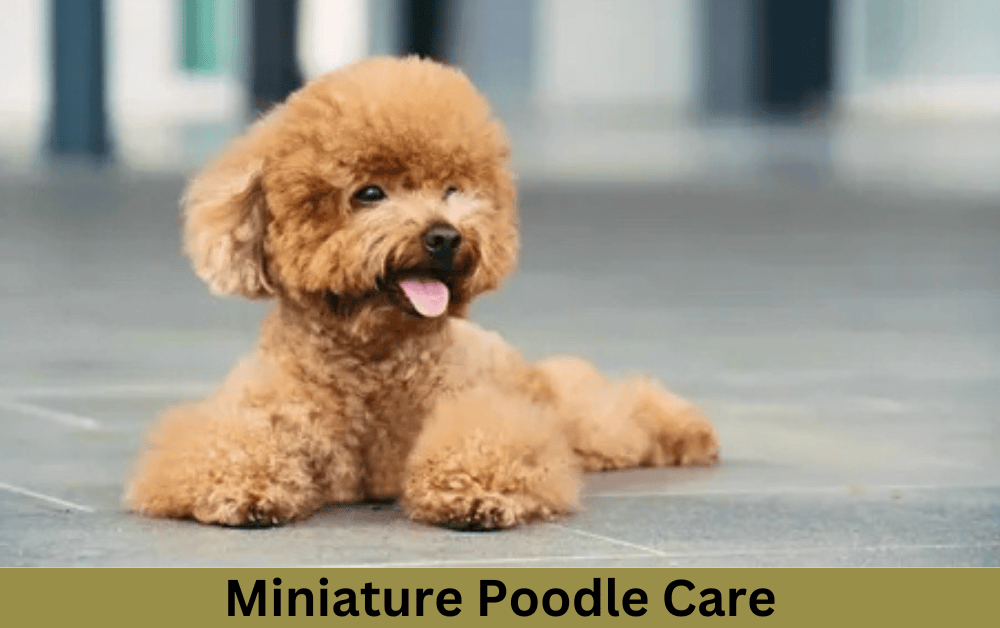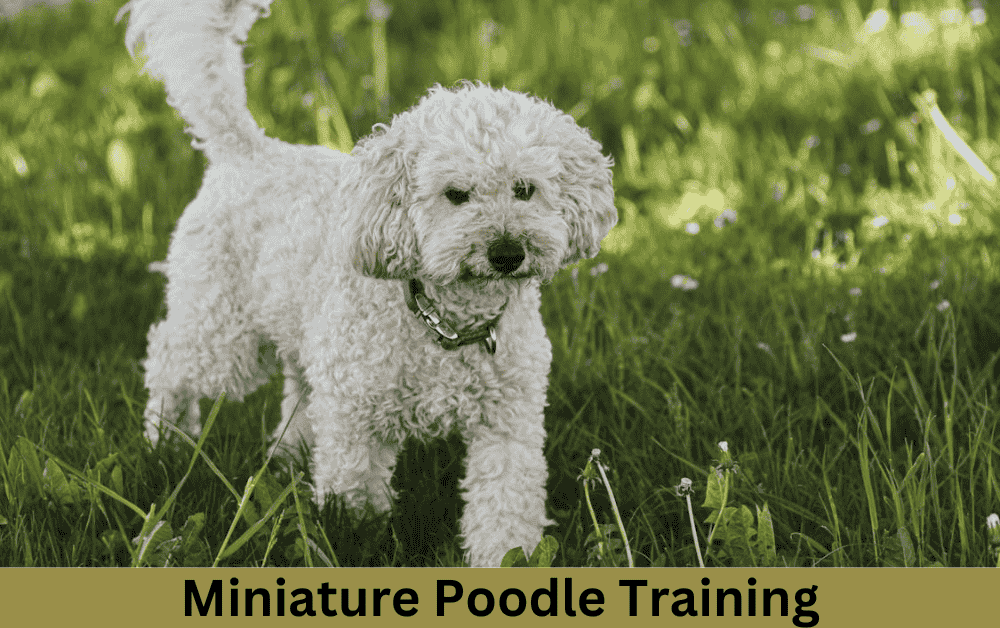In this article, we’ll explain what makes Miniature Poodles special, including their temperament, grooming needs, and health care. By the end, you’ll see why so many people consider them one of the best dog breeds for companionship.
Miniature Poodle Characteristics

Miniature Poodle puppies are the middle-sized members of the Poodle family, larger than Toys but smaller than Standards. These dogs usually weigh 10 to 15 pounds and stand 10 to 15 inches tall. Don’t let their size fool you—they’re bursting with energy, smarts, and charm.
Quick Facts
- Weight: 10-15 pounds.
- Height: 10-15 inches.
- Coat: Hypoallergenic, low-shedding, and comes in colors like black poodles, white poodles, apricot poodles, and silver poodles.
- Intelligence: Among the smartest dog breeds.
Miniature Poodle dogs shine brightest because of their intelligence. They rank near the top of the smartest dog breeds, mastering obedience training and picking up commands faster than most. Their cleverness makes them perfect for families who want a quick-learning, attentive pet. Years ago, these dogs even worked as skilled water retrievers, proving how adaptable they are.
Another big plus? Their hypoallergenic coats. While many dogs shed fur everywhere, Miniature Poodles barely leave a trace—great news for allergy sufferers! Their curly, plush fur comes in shades like black, white, apricot, and silver, so you can pick your favorite look. Just remember: regular brushing and grooming keep their coats tangle-free and stylish.
Why Choose a Miniature Poodle?
Adaptability
Miniature Poodle puppies are incredibly adaptable, making them suitable for various living environments. Whether you live in a city apartment in the US or a countryside cottage in the UK, Miniature Poodles can thrive as long as they receive adequate attention and exercise.
Good Family Pets
Miniature Poodle dogs are excellent family dogs. Their friendly temperament allows them to bond well with children and other pets. They’re gentle yet playful, making them a perfect companion for kids. Moreover, their intelligence and trainability ensure they can adapt to household rules quickly.
Key Points:
- Highly adaptable to different living spaces.
- Great with children and other pets.
- Known for being gentle and playful.
Hypoallergenic Benefits
If allergies have been a barrier to owning a dog, a Miniature Poodle might be the solution. Their hypoallergenic coats significantly reduce the risk of allergic reactions, making them a popular choice in both the US and the UK.
Miniature Poodle Health and Lifespan
Like all breeds, Miniature Poodle dogs have specific health concerns that potential owners should be aware of. Common issues include hip dysplasia, progressive retinal atrophy (PRA), and Addison’s disease. They are also prone to dental health problems like periodontal disease, which require regular care to manage. Floppy ears can lead to ear infections if not cleaned regularly.
Key Points:
- Common health concerns: hip dysplasia, PRA, Addison’s disease, and dental health issues.
- Average lifespan: 12-15 years.
- Regular check-ups and a balanced diet are essential for longevity.
The average lifespan of a Miniature Poodle ranges from 12 to 15 years, and some even live longer with proper nutrition, exercise, and medical care. Feeding them a balanced diet and ensuring they get enough physical and mental stimulation are key to their longevity.
Miniature Poodle Grooming Requirements

Miniature Poodles’ coats require regular grooming to prevent matting and keep them looking their best. Professional grooming every six to eight weeks is recommended, along with weekly brushing at home. Many owners enjoy styling their Poodles’ coats in various ways, from traditional Poodle cuts to more modern styles.
Key Points:
- Regular grooming every 6-8 weeks is necessary.
- Weekly brushing prevents matting.
- Their coats can be styled in various ways.
Grooming isn’t just about aesthetics; it’s also essential for their overall health. Regular grooming sessions allow you to check for skin issues, ear infections, or parasites. Their minimal shedding is another advantage for owners who want a clean home without dealing with excessive dog hair.
Miniature Poodle Training and Exercise Needs

Miniature Poodle dogs are highly trainable thanks to their intelligence and eagerness to please. Positive reinforcement methods, such as treats and praise, work best when teaching commands and tricks. Early socialization is crucial to ensure they grow up to be well-mannered dogs.
Key Points:
- Highly intelligent and easy to train.
- Positive reinforcement works best.
- Require daily walks and mental stimulation.
In terms of exercise, Miniature Poodles require moderate physical activity. Daily walks, playtime, and mental stimulation are essential to keep them happy and healthy. They also excel in canine sports like agility and obedience competitions, which can be a fun way to bond with your pet. Owners should watch for signs of joint issues, such as luxating patella, and ensure proper care.
Miniature Poodles vs. Other Poodle Sizes
When deciding between a Miniature Poodle puppy and other sizes, it’s essential to consider your lifestyle. Standard Poodles are larger and require more space and exercise, making them better suited for active households with ample outdoor areas. On the other hand, Toy Poodles are smaller and may be more delicate, especially in households with young children.
| Feature | Toy Poodle | Miniature Poodle | Standard Poodle |
| Height | Under 10 inches | 10-15 inches | Over 15 inches (usually 22-27″) |
| Weight | 4-6 lbs | 10-15 lbs | 45-70 lbs |
| Origin | Bred as companions | Scaled-down Standards | Original hunting/water retrievers |
| Energy Level | Moderate | High | Very High |
| Best For | Apartment living | Active singles/seniors | Active owners with space |
| AKC Recognition | Yes (Toy Group) | Yes (Non-Sporting) | Yes (Non-Sporting) |
| FCI Recognition | Yes | Yes | Yes |
Key Points:
- Standard Poodles: Larger, require more exercise and space.
- Toy Poodles: Smaller, more delicate.
- Miniature Poodles: Perfect balance of size, adaptability, and temperament.
Miniature Poodles strike the perfect balance, offering the intelligence and elegance of the Standard Poodle in a more compact size. Their adaptability makes them a popular choice for various lifestyles, from bustling city living to quiet rural homes.
Miniature Poodles in the US and UK
In both the US and UK, Miniature Poodle puppies are a favorite among dog enthusiasts. Their popularity has led to numerous reputable breeders and adoption opportunities. When searching for a Miniature Poodle, it’s essential to choose a responsible breeder who prioritizes the health and well-being of their dogs.
Alternatively, adopting a Miniature Poodle from a rescue organization is a wonderful way to provide a loving home to a dog in need. Many Poodle-specific rescues operate in both countries, offering a chance to find a Miniature Poodle that fits your family.
Owner’s Experience
I have a miniature poodle named Max, and he is the best dog ever! He is smart, playful, and so loving. Many people think small dogs are yappy or nervous, but Max proves them wrong. He has the perfect personality and makes every day fun.
First, Max learns tricks super fast. He mastered “sit,” “stay,” and “roll over” in just a few days. Sometimes, it feels like he understands everything I say! His intelligence amazes me. Unlike some stubborn dogs, Max loves training because he enjoys the challenge.
Second, he has endless energy but knows when to relax. We play fetch in the yard, and he runs faster than any big dog I know. But when it’s time to cuddle, he curls up next to me like a fluffy teddy bear. His soft fur doesn’t shed much, so my clothes stay clean—no annoying dog hair everywhere!
3 Myths About Miniature Poodles – Busted!
People often get miniature poodles wrong. After having one, I can confirm these myths are totally false!
Myth 1: “They’re just prissy lap dogs.”
Truth: Miniature Poodle is a total athlete! They love running, playing fetch, and even hiking. Don’t let their size fool you—they have endless energy and keep up with big dogs easily.
Myth 2: “They’re fussy and high-maintenance.”
Truth: Sure, their curly fur needs brushing, but they barely shed—way less mess than most dogs. Miniature Poodles are tough, playful, and loves rolling in dirt like any happy pup.
Myth 3: “Small dogs aren’t as smart as big ones.”
Truth: Mini poodles are geniuses. They learn “sit,” “stay,” and “paw” in days and can solve treat puzzles and even tries opening doors. Their brains are huge for their size!
Miniature poodles are the perfect mix of smart, fun, and low-shedding. Once you have one, you’ll see why they’re the best!
Conclusion
Miniature Poodles are undoubtedly one of the best dog breeds for a wide range of households. Their intelligence, hypoallergenic coats, and friendly nature make them an ideal choice for families, singles, and seniors. Whether you’re in the US or UK, Miniature Poodles can adapt to your lifestyle and provide years of companionship and joy.
By choosing a Miniature Poodle, you’re not just getting a pet; you’re gaining a loyal friend and a loving family member. With proper care, training, and attention, these delightful dogs can truly enrich your life. So, if you’re considering adding a new furry member to your household.
Common Questions About Miniature Poodles
Are Miniature Poodles good with children?
Yes, Miniature Poodles are great with children. Their playful and gentle nature makes them an excellent choice for families with kids.
Do Miniature Poodles get along with other pets?
Absolutely! Miniature Poodles are known for their friendly temperament and can get along well with other dogs and even cats.
How much exercise do Miniature Poodles need?
While they don’t require excessive exercise, daily walks and playtime are essential to keep them physically and mentally stimulated.
Are Miniature Poodles easy to train?
Yes, their intelligence and eagerness to please make them one of the easiest breeds to train. Positive reinforcement methods work best.

